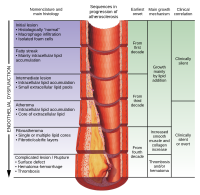
Photo from wikipedia
BACKGROUND Emerging evidence links gut microbiota to various human diseases including colorectal cancer (CRC) initiation and development. However, gut microbiota profiles associated with CRC recurrence and patient prognosis are not… Click to show full abstract
BACKGROUND Emerging evidence links gut microbiota to various human diseases including colorectal cancer (CRC) initiation and development. However, gut microbiota profiles associated with CRC recurrence and patient prognosis are not completely understood yet, especially in a Chinese cohort. AIM To investigate the relationship between gut mucosal microbiota profiles and CRC recurrence and patient prognosis. METHODS We obtained the composition and structure of gut microbiota collected from 75 patients diagnosed with CRC and 26 healthy controls. The patients were followed up by regular examination to determine whether tumors recurred. Triplet-paired samples from on-tumor, adjacent-tumor and off-tumor sites of patients diagnosed with/without CRC recurrence were analyzed to assess spatial-specific patterns of gut mucosal microbiota by 16S ribosomal RNA sequencing. Next, we carried out bioinformatic analyses, Kaplan-Meier survival analyses and Cox regression analyses to determine the relationship between gut mucosal microbiota profiles and CRC recurrence and patient prognosis. RESULTS We observed spatial-specific patterns of gut mucosal microbiota profiles linked to CRC recurrence and patient prognosis. A total of 17 bacterial genera/families were identified as potential biomarkers for CRC recurrence and patient prognosis, including Anaerotruncus, Bacteroidales, Coriobacteriaceae, Dialister, Eubacterium, Fusobacterium, Filifactor, Gemella, Haemophilus, Mogibacteriazeae, Pyramidobacter, Parvimonas, Porphyromonadaceae, Slackia, Schwartzia, TG5 and Treponema. CONCLUSION Our work suggests that intestinal microbiota can serve as biomarkers to predict the risk of CRC recurrence and patient death.
Journal Title: World Journal of Gastroenterology
Year Published: 2022
Link to full text (if available)
Share on Social Media: Sign Up to like & get
recommendations!